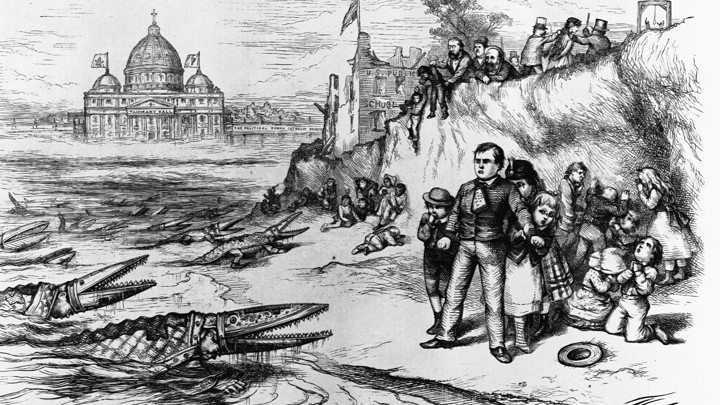ARTICLES - HOT OFF THE FAGGOT
Vatican Attack on the Blaine Amendments of Separation of Church and State
ATTENTION: THE BATTLE FOR THE CONSTITUTION
The Court Case That Could Finally Take Down Antiquated Anti-Catholic Laws
Thirty-seven states still have Blaine Amendments on the books. The Supreme Court now has a chance to get rid of them for good.

A cartoon by Thomas Nast depicting Catholic bishops as crocodiles eager to gobble up American schoolchildren. It first appeared in Harper's Weekly on September 30, 1871.CORBIS / GETTY
Blaine Amendments weren’t truly devoted to the separation of Church and state. Instead, they were mainly focused on separating the Catholic Church and state. Although public schools are largely secular today, that wasn’t the case in the 19th century. Public or “common” schools typically instilled in their students a nondenominational form of Protestantism, requiring them to sing hymns, pray, and read from the King James Bible—in direct conflict with Catholic dogma.
Blaine’s amendment was never enacted nationwide, Congress later required many potential states to adopt a version of the amendment in order to be admitted to the union. President Ulysses S. Grant called for a federal ban on government funding for “sectarian schools” in order to “keep the Church and state forever separate.”
No State shall make any law respecting an establishment of religion, or prohibiting the free exercise thereof; and no money raised by taxation in any State for the support of public schools, or derived from any public fund therefor, nor any public lands devoted thereto, shall ever be under the control of any religious sect; nor shall any money so raised or lands so devoted be divided between religious sects or denominations.
Attorney General William Barr on Religious Liberty
Attorney General William P. Barr Delivers Remarks to the Law School and the de Nicola Center for Ethics and Culture at the University of Notre Dame
Subscribe to:
Posts (Atom)
